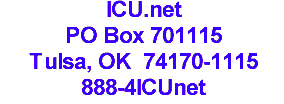 |
 |
![]()
| ICU.net Incorporated began as
Cottage Software, a sole proprietorship, in Wichita, KS in 1977. It was formed by Bill and
Kay Brunton. The initial purpose of the company was to provide software and hardware in
support of the Radio Shack line of TRS80 computers. Bill had purchased a TRS80 Model I in
early 1977, and began writing programs to suit his interests. Soon was receiving requests
from others for copies of his programs, or to custom write a program. Some of the programs offered for sale were:
|
In addition to producing software for the
TRS80, Cottage Software began to perform repairs and modifications to TRS80 Model I, and
later II, III, and IV, computers. These modifications included increasing the Z80
microprocessor speed from 1.8Mhz to over 6Mhz, adding support for lower case letters,
(something Tandy left out), installing double sided, double density floppy disk drives,
and just about any other custom modification a user could want. In 1980, a Compupro, S100 bus computer was purchased, and support of CP/M and S100 machines began. As a retailer for Compupro Systems, many were sold to both individual users, and businesses. In 1982, Compupro had a dual processor card that permitted running both 8 bit CP/M and 16 bit MP/M software, in a multi user, multi tasking environment. This was accomplished initially with MP/M86, and later with Concurrent DOS. Both operating systems were from Digital Research. In 1983, a program was written to convert a Lear Seigler ADM 31 smart serial terminal into a terminal that would emulate a Burroughs Terminal using the proprietary Burroughs Polling Protocol. This program, written in Motorola 6800 assembly language, was place into EPROMs for installation into the terminals, and successfully sold by the thousands to users of Burroughs Mainframe computers. Cottage Software operated the Forum 80 Bulletin Board System of Wichita KS. The Forum 80, written by Bill Abney of Kansas City, MO. was one of the first bulletin board systems available for personal computers. At first it operated on a TRS80 Model I, with a 300 baud modem. Later, in the middle of the 80's it was upgraded to a TRS80 Model IV and a 1200 baud, and finally a 2400 baud modem. The Forum 80 received calls from all over the country, and Cottage Software marketed computer hardware, and software, with on line order taking through the BBS. The Forum 80 was shut down in 1985 after having operated for 7 years The earlier successes of Cottage Software Inc. were able to sustain it well through the first years of sales by IBM of their then new PC. However, as the PC took over, the demand for S100 machines, while still there, was not enough and the corporation was closed in 1990. The name was still in use as a sole proprietorship, and some software was written for specialized applications on request, but the level of activity was extremely low. In 1995, with the tremendous growth of the Internet, a need was identified for an Internet Provider in Tulsa, Oklahoma. In addition it was determined that local businesses would be needing assistance in placing advertisements and promotions on the World Wide Web. This is the reason Cottage Software Inc. was formed, now in Oklahoma. ICU.net is now providing dial up Internet access to business and the public. In addition, World Wide Web page design, and Internetworking consulting is also available.
|
|
|
|
HOME | EMAIL | CONTACT US | PRIVACY POLICY |

Copyright © 2005 By: ICU.net Inc., Tulsa, OK USA